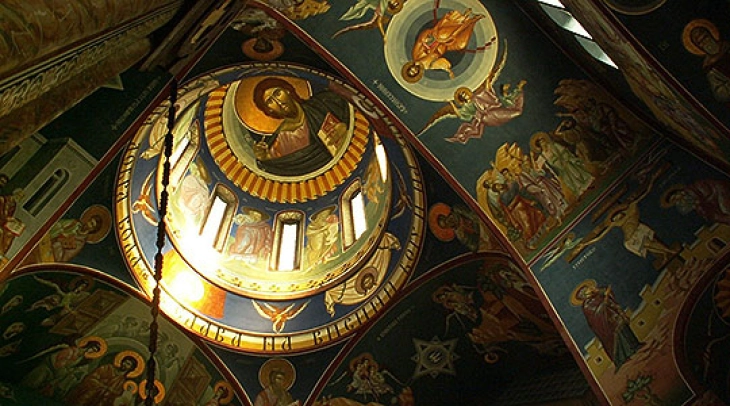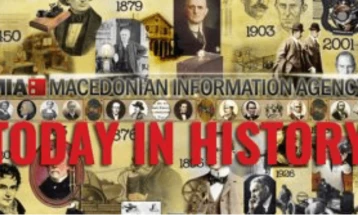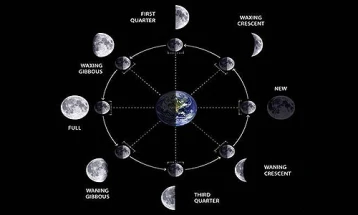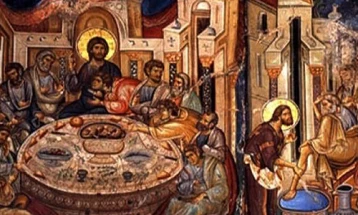Religioous calendars
- These five courageous men shone like five resplendent stars in the dark days of the anti-Christian Emperors Diocletian and Maximian.

26 December 2024 (MIA)
Macedonian Orthodox Church Calendar
The Holy Martyrs Eustratius, Auxentius, Eugene, Mardarius and Orestes
These five courageous men shone like five resplendent stars in the dark days of the anti-Christian Emperors Diocletian and Maximian. St Eustratius was a Roman general in the city of Satalios, Eugene was one of his comrades in arms and Orestes likewise a respected soldier. Auxentius was a priest and Mardarius a simple citizen who came, like Eustratius, from the town of Aravraca. The imperial governors, Lysias and Agricola, tortured Auxentius first as he was a priest. Beholding the innocent suffering of the Christians, Eustratius presented himself before Lycias and declared that he also was a Christian. While Eustratius was being tortured, Eugene stood up before the judge and cried out: ‘I am a Christian too, Lycias!’ When they were driving Eustratius and the other martyrs through the town, Mardarius saw them from the roof of his house, and he took leave of his wife and two frail daughters and hastened after them, shouting into the faces of their tormentors: ‘I am a Christian too, like the Lord Eustratius!’ Orestes was a young and handsome soldier, who stood head and shoulders above all the other soldiers. One day, when he was at target practice in Lycias’s presence, the Cross he was wearing fell from his breast, and Lycias realised that he was a Christian. Orestes openly confessed his faith, and was martyred with the others. Auxentius was beheaded, Eugene and Mardarius died under torture, Orestes was exposed on a red-hot iron grid and Eustratius died in a flaming furnace. St Blaise (see Feb. 11th) gave Communion to St Eustratius in prison before his death. Their relics were later taken to Constantinople, and are preserved in the church dedicated to them -The Holy Five Companions. They were seen alive in that church, and St Orestes appeared to St Dimitri of Rostov (see Oct. 28th). A beautiful prayer by St Eustratius is extant, which is read at the Midnight Service on Saturdays: ‘I glorify Thy majesty, O Lord for Thou hast regarded my lowliness and hast not shut me up in the hands of my enemies, but hast saved my soul from want…’
Catholic Calendar
St. Stephen
Stephen’s name means “crown,” and he was the first disciple of Jesus to receive the martyr’s crown. Stephen was a deacon in the early Christian Church. The apostles had found that they needed helpers to look after the care of the widows and the poor. So they ordained seven deacons, and Stephen is the most famous of these. God worked many miracles through St. Stephen and he spoke with such wisdom and grace that many of his hearers became followers of Jesus. The enemies of the Church of Jesus were furious to see how successful Stephen’s preaching was. At last, they laid a plot for him. They could not answer his wise argument, so they got men to lie about him, saying that he had spoken sinfully against God. St. Stephen faced that great assembly of enemies without fear. In fact, the Holy Bible says that his face looked like the face of an angel. The saint spoke about Jesus, showing that He is the Savior, God had promised to send. He scolded his enemies for not having believed in Jesus. At that, they rose up in great anger and shouted at him. But Stephen looked up to Heaven and said that he saw the heavens opening and Jesus standing at the right hand of God. His hearers plugged their ears and refused to listen to another word. They dragged St. Stephen outside the city of Jerusalem and stoned him to death. The saint prayed, “Lord Jesus, receive my spirit!” Then he fell to his knees and begged God not to punish his enemies for killing him. After such an expression of love, the holy martyr went to his heavenly reward.







